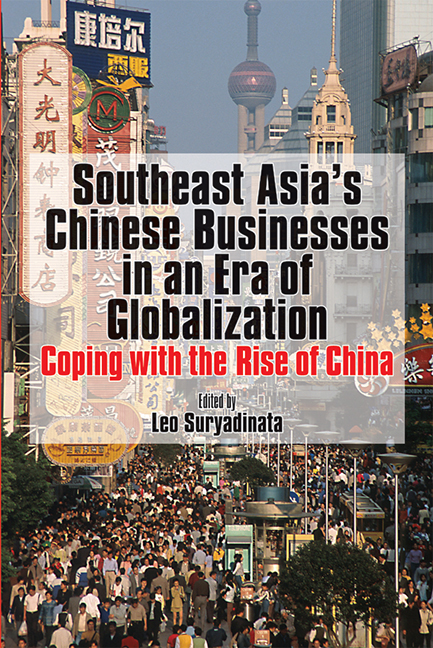Book contents
- Frontmatter
- Contents
- The Contributors
- Introduction
- China and Southeast Asia
- Indonesia
- 3 Flattening Impact of a Reawakening China on Ethnic Imbalance in Indonesian Business
- 4 The Indonesian Government's Economic Policies towards the Ethnic Chinese: Beyond Economic Nationalism?
- 5 Chinese Indonesian Business in the Era of Globalization: Ethnicity, Culture and the Rise of China
- Malaysia
- The Philippines
- Singapore and Thailand
- Index
4 - The Indonesian Government's Economic Policies towards the Ethnic Chinese: Beyond Economic Nationalism?
from Indonesia
Published online by Cambridge University Press: 21 October 2015
- Frontmatter
- Contents
- The Contributors
- Introduction
- China and Southeast Asia
- Indonesia
- 3 Flattening Impact of a Reawakening China on Ethnic Imbalance in Indonesian Business
- 4 The Indonesian Government's Economic Policies towards the Ethnic Chinese: Beyond Economic Nationalism?
- 5 Chinese Indonesian Business in the Era of Globalization: Ethnicity, Culture and the Rise of China
- Malaysia
- The Philippines
- Singapore and Thailand
- Index
Summary
THE ROLE OF ECONOMIC NATIONALISM
To a much greater degree than has been the case in the other newly- independent countries in Southeast Asia, economic nationalism in Indonesia has remained a potent force until the present. Although its contemporary manifestations has in general become less aggressive and less strident than in the 1950s, it remains a driving force that to a large extent still influences economic policies today. Whereas economic nationalism during the early years of independence in the 1950s was mainly directed at the economic dominance of the Dutch and ethnic Chinese business interests, in the years following the Asian economic crisis in the late 1990s, it was mainly aimed at the perceived interference of international organizations, particularly the IMF, in the formulation of Indonesia's economic policies.
Despite the strong economic nationalism, pragmatic considerations have often overruled ill-considered economic nationalism. In this way, pragmatic policies have often been able to mitigate the adverse economic and political effects of emotional economic nationalism. This was already evident when the Indonesian Government in the second half of the 1950s terminated the unsuccessful “Benteng” (Fortress) Programme, which was the Indonesian Government's first affirmative policy to promote indigenous Indonesian businessmen (pengusaha asli Indonesia).
THE ‘CHINESE PROBLEM’
Unlike the Malaysian Government, which since 1970 has pursued an explicit affirmative policy, the New Economic Policy (NEP), to advance the economic position and intensify the political hegemony of the Malay bumiputera population (Jesudason 1997, p. 124), the Indonesian Government since the early years of independence up to the present has never formulated a comprehensive economic policy relating to the Chinese minority. Although laws and decrees were issued which regulated the life and activities of the Chinese minority, such as its economic activities, these laws and regulations had an ad hoc character, which were not part of a comprehensive policy towards the Chinese (Coppel 1983, p. 29).
This absence of a comprehensive policy was not caused because the Chinese were not seen as a “problem”, but because the Indonesian Government in the early 1950s tended to be fragmented, which made coordinated policy-making, including policy formulation towards the Chinese difficult (Coppel 1983, p. 29).
- Type
- Chapter
- Information
- Southeast Asia's Chinese Businesses in an Era of GlobalizationCoping with the Rise of China, pp. 76 - 101Publisher: ISEAS–Yusof Ishak InstitutePrint publication year: 2006



